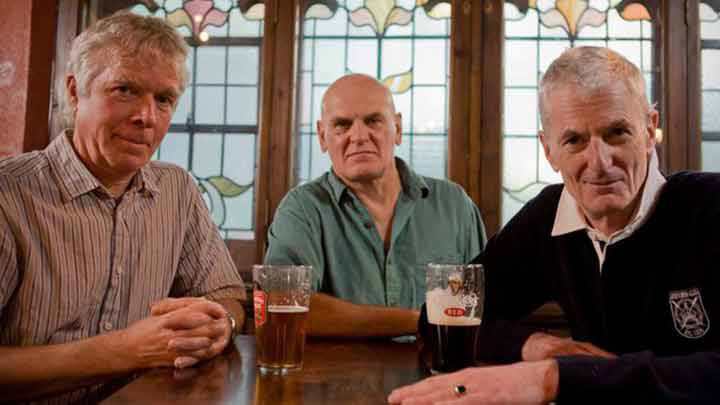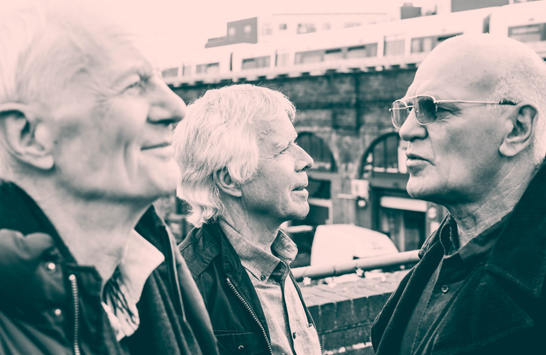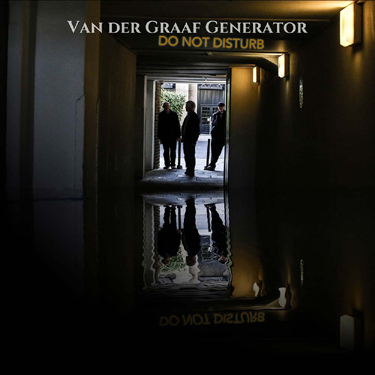VAN DER GRAAF GENERATOR

Peter Hammill interview
by Robin Cook
(December 2016)
Art-rock iconoclasts Van der Graaf Generator reformed in 2005, after a quarter century apart. Mind you, the band members never stopped collaborating even when VDGG itself was defunct. Hugh Banton and Guy Evans have performed on frontman Peter Hammill's solo albums. Banton even put out two classical albums on Hammill's Fie! label.
VDGG may have emerged during the 1970s prog era, but they always stood apart, even with the side-long album tracks and the occasional Robert Fripp guest appearance. Like Crimson, VDGG was darker and knottier. Small wonder that Johnny "I Hate Pink Floyd" Rotten was a fan. Do Not Disturb is the band's new latest release. Perfect Sound Forever interviewed Hammill about the new album and the band's quirky, winding history.
PSF: Hugh Banton said that in VDGG's early days, "We all grabbed our own space as best we could." How has the band's dynamic changed since then?
PH: Still pretty mucbh that, although maybe we're more generous at creating space for our fellow members to fill. Also, it has to be said, we're more keen on leaving space open than we used to be!
PSF: VDGG does have--dare I say it--a funky side. Take, for example, the song "Tarzan." Are you (or were you) funk fans?
PH: Never knowingly over-fannish in any particular music direction. Nor ever knowingly denying of any music which has good intentions at heart.
PSF: You have recorded instrumental albums as a soloist and with VDGG (for example, on Alt). Did you find a learning curve was involved in writing and performing without the human voice in the mix?
PH: The same musical imperatives remain whether there's voice involved or "just" instruments...or even "just" noise. Obviously, though, having a voice there at the centre of things gives an immediate focus which one has to create in a different way with instrumental stuff.
PSF: On Alt, all three members share writing credit on the album. After years as the primary songwriter, did you find any challenges to writing with a unit?
PH: These days we give credit to ourselves as a collective no matter who had the original inspiration or did the actual writing. Simpler that way.
PSF: You maintain a solo career in addition to VDGG. How do you balance them?
PH: We know exactly when we're heading into a period of VdGG activity and when that happens, I tend to place that at the forefront of my mind. I don't think it would work if all of us didn't do that. Away from VdGG, I carry on messing about with things in my own time-honoured fashion!
PSF: Van der Graaf Generator was classified as a prog band. Were you comfortable with that label? Were there any bands you felt were kindred spirits?
PH: We've become more accustomed to it over the years. Also (it seems to me) it's now much more of a broad definition than it used to be. It's no longer a "back-to-the-70s" deal, which we certainly wouldn't have aligned ourselves with.
No, no particular kindred spirits for us. We've always felt like - or maybe made ourselves - outsiders.
PSF: You said in a recent interview, "I was kind of writing about us. It's by us and it's about us." Could you elaborate a bit more on that?
PH: Certainly some of our common and individual experiences ion the course of the band's lifetime have gone into the songs. It's been a funny old trip at times!
PSF: You've written songs in the past that were personal in nature, but primarily as a solo artist. What was it like for you and the rest of the band to perform this material in a group format?
PH: I suppose that we'll only commit to performing something (solo or band) if we feel that we can all get behind its emotional heft. So even if something starts as "solo" it gets a band seal of authenticity when we do it as a band.
PSF: "(Oh No, I Must Have Said) Yes" is one of the wittiest songs on the album. Was there anything in real life that inspired it?
PH: It's a long standing VdGG principle. However strange or disconcerting the situation may be in which we find ourselves then, surely, somewhere along the way we must all have said "yes"!
PSF: Do you listen to any newer artists? Have any of them influenced you?
PH: Briefly, no.
PSF: One of the biggest misconceptions about prog artists of your generation is that you're humorless. But VDGG definitely has a sense of humor, despite your reputation as a "dark" band.
PH: We think we're pretty jocular at times, yes. Also, I think it's pretty evident that we've always had a lot of fun playing. It's just that sometimes our fun consists of making a pretty terrifying racket.

PSF: Guy Evans' drumming is quite prominent in the mix. Was this intentional? I ask because his style is heavier and more metallic than it used to be.
PH: This time, he had the opportunity to do some overdubs *after* HB (Hugh Banton) and I had finished ours. So maybe the presence of those meant that the overall balance of percussion shifted as well. We think it's great for him to be pushed forward, obviously - he deserves it!
PSF: Hugh Banton's organ is a crucial part of the band's sound. He once said that VDGG couldn't afford synthesizers during prog's heyday in the 1970's.
PH: kind of. But in any event he's always regarded himself as an organist (and bass player) rather than a keyboardist.
PSF: Ironically, the organ sound, and the absence of then-new musical technology, means that the band doesn't sound dated. Any thoughts on that?
PH: That's true. There's little that sounds as dated as last year's synth sound (well, maybe last year's drum sound!). And then, in turn, some years later everyone will be striving to find it. For me, music rather than sound is of the essence.
PSF: VDGG covered George Martin's "Theme One" in the early 1970's. In light of Martin's passing this year, I'm wondering if you got any feedback from him on your version of the song.
PH: I believe he found it amusing. And welcomed the royalties ;-).
PSF: Your bandmates in VDGG backed you on your solo album Nadir's Big Chance. What was it like for you to be playing freewheeling rock and roll for a change? (especially the title track, which you performed live together)
PH: This was the first time that we played together, having decided to reform. So the aggro and volatility of those sessions undoubtedly fed through into the oncoming VdGG work.
PSF:John Lydon is a fan of yours. What do you think of his work with the Sex Pistols or Public Image?
PH: Both were interesting. And of their time.
PSF: What advice would you have for young musicians today?
PH: I'd wish them all the luck in the world, as they'll need it. I've no doubt that I wouldn't get a foot in the door at all if I was starting these days...

Do Not Distrub is available now from Cherry Red
Also see our previous Peter Hammill interview, Van Der Graaf interview, our article on Hammill's early solo years
and our 2005 article about VDGG's post-millennium reunion